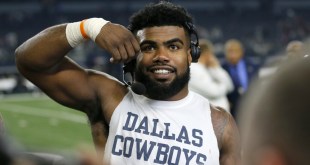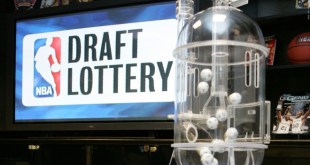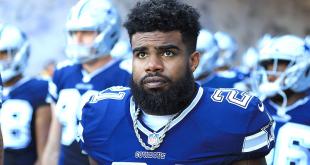The NFL may have taken over a year to investigate, release its report, announce its decision, and now hold an arbitration appeal hearing. But with the NFL season set to start next week, we didn’t have to wait nearly that long for the expected lawsuit and injunction request to be filed after the end of the arbitration.
Late Thursday night, the NFL Players Association (NFLPA), both on its own behalf and on behalf of Ezekiel Elliott, filed a lawsuit asking a federal court in the Eastern District of Texas to vacate a ruling that NFL arbitrator Harold Henderson has not even reached yet. The arbitration—which began on Tuesday and had concluded only a few hours before the NFLPA filed the suit—is an appeal from the 6-game suspension NFL commissioner Roger Goodell imposed on Elliott on August 11 for Elliott’s alleged abuse of ex-girlfriend Tiffany Thompson. The NFLPA followed that up by filing an Emergency Motion for Temporary Restraining Order or Preliminary Injunction (the “TRO Motion”), asking the court to enjoin Elliott’s suspension until the lawsuit can be decided on its merits. Arguments on the TRO Motion will be heard by Judge Amos L. Mazzant at 5:00 p.m. on Tuesday, September 5.
Goodell’s basis for suspending Elliott has become well-known in past years. Section 46 of the Collective Bargaining Agreement (CBA) grants Goodell the power to discipline players for “conduct detrimental” to the NFL. Pursuant to that authority, Goodell issued a Personal Conduct Policy (the “PCP”), which mandates a 6-game suspension for cases involving domestic or dating violence. That would certainly apply to the allegations against Elliott, if they are true. But in the absence of a criminal charge or conviction, a player can be suspended only if “credible evidence” establishes that he engaged in conduct prohibited by the PCP. So, not surprisingly, the arguments raised by the NFLPA in its lawsuit and TRO Motion focus on how the evidence used to suspend Elliott is far from credible, and the arbitration proceeding this week was far from fair.
What the NFLPA Alleges
In its lawsuit and TRO Motion, the NFLPA presents three main examples of how the NFL’s process for disciplining Elliot was fundamentally unfair.
First, the NFLPA argues that NFL Senior VP and Special Counsel for Investigations Lisa Friel and other NFL executives conspired to conceal important evidence from Elliott, the NFLPA, and Goodell. Most importantly, the NFLPA says Friel concealed the fact that Kia Roberts, the NFL Director of Investigations and co-lead of the investigation, concluded that Thompson and her allegations of abuse were not credible, and there was not sufficient evidence to impose any discipline on Elliott. According to the NFLPA, Roberts performed most of the heavy lifting in the investigation. She conducted all but one of the fact interviews, including all six interviews of Thompson, and co-authored a final report on the investigation (the “Elliott Report”).
Nevertheless, as the NFLPA argues, Roberts was not invited to a June 26, 2017 meeting in which Friel, who believed there was sufficient evidence to suspend Elliott, presented the findings of the Elliott Report and answered questions from expert advisors appointed by Goodell. Further, Friel and other NFL executives decided to “deliberately omit[] a conclusion” to the Elliott Report. According to the NFLPA, such a conclusion would have included Roberts’s conclusion that no discipline should be asserted. The NFLPA did not find out about Roberts’s conclusions until the first day of the hearing, Tuesday, August 29.
I’m not sure if there truly was a “conspiracy” to hide Roberts’s conclusions from Goodell and the NFLPA, but it is curious that Roberts was not given the same opportunities to provide her conclusions to Goodell as Friel was.
Second, the NFLPA argues that Henderson denied the NFLPA’s requests to require Thompson to testify during arbitration, or to require the NFL to provide notes of four Thompson interviews that were not transcribed. If this were a criminal trial or other similar court proceeding, the denial of the NFLPA’s request to question Thompson would not only be troubling, but unconstitutional under the Confrontation Clause of the 6th Amendment. However, this is not a criminal trial, and the precedent for discipline under the PCP is a still-developing mess. As such, Elliott does not have a constitutional right to confront Thompson at the arbitration. However, the NFLPA focuses on the notion that, although this is not a criminal proceeding, federal law requires “fundamental fairness” in arbitrations, and not allowing the Elliott and the NFLPA the right to examine whether Thompson’s testimony is credible, as required by the PCP, is fundamentally unfair.
Third, Henderson denied the NFLPA’s request to question Goodell himself at the arbitration. The NFLPA’s theory here is that because Goodell was not required to testify, the NFLPA could not determine whether he knew about Roberts’s conclusion regarding Thompson’s credibility and her view that Elliott should not be disciplined when he made his decision on August 11 to suspend Elliott for six games.
Chances of Success on TRO
To be entitled to a preliminary injunction or Temporary Restraining Order, the NFLPA and Elliott must show: (1) a substantial likelihood that its case will be successful on the merits of its arguments; (2) that Elliott will suffer irreparable harm if the injunction is not granted; (3) the threatened harm to Elliott outweighs any damage the injunction would cause the NFL (also known as the “balance of the hardships”); and (4) the injunction does not disserve the public interest.
The irreparable harm prong will be easy to prove. If the injunction is not granted, Ezekiel Elliott will begin serving his suspension (be it six games or another length determined by Henderson) and will lose out on money and games he cannot recoup.
Similarly, the balance of the hardships prong likely goes in Elliot’s favor, as the harm to Elliot of losing games and money if the injunction is denied is certainly greater than the harm to the NFL if the injunction is granted. In fact, the NFL would probably benefit more if the injunction is granted, since Elliott playing in games would be more likely to attract more ticket buyers and TV viewers.
The public service prong is less clear cut, but is not likely to be the determinative factor here.
What the TRO hearing comes down to is the question of whether it is substantially likely that the NFLPA’s claims will be successful should the case proceed further. The NFLPA wants to make this case about the question of whether the evidence was credible and whether the arbitration hearing was fundamentally unfair. In a normal case, those would be good arguments. However, it’s very likely this case will come down to whether the district court and the 5th Circuit above it believe that the CBA gives Goodell and the NFL representatives he appoints the right to essentially make disciplinary procedure up as they go along. Although precedent set by the 2nd Circuit in the Brady Deflategate appeal is not necessarily controlling in the 5th Circuit, it seems likely it will carry some weight in swaying Judge Mazzant and the appellate court justices above him.
Why File Now?
Some will say it would have made more sense for Elliot and the NFLPA to wait for Henderson to issue his ruling next week before filing the lawsuit. Indeed, whether the issues raised by the NFLPA are ripe (i.e. all other avenues of resolving the controversy have been exhausted and the matter is ready to be litigated) will almost certainly be an issue raised by the NFL. But there are several likely reasons for why the NFLPA would preemptively file the suit and TRO Motion before Henderson issued his ruling.
First, if you believe what they allege in the lawsuit, the NFLPA and Elliott’s camp did not know about Roberts’ conclusions regarding Thompson’s credibility until the arbitration hearing this week. It’s possible they saw the perceived exclusion of Roberts and her investigative materials from key moments in the proceedings for the first time at the arbitration hearing and decided they needed to immediately file suit.
Second, Elliot and the NFLPA want to establish venue in a district and circuit other than the Southern District of New York and the 2nd Circuit, since they already know how the 2nd Circuit is likely to rule on arbitration award under the CBA (see Deflategate). But that’s the obvious strategy.
The third, and perhaps more compelling reason, is to give themselves and Elliot some additional leverage ahead of Henderson’s anticipated decision on Tuesday. Think about it this way. Without a TRO hearing set for Tuesday afternoon, Henderson would have been under much less pressure over the Labor Day weekend regarding his decision. He could have taken his sweet time, announced his decision that the 6-game suspension would stand, then allowed the chips to fall where they may in the ensuing fight between the NFL and NFLPA. Now, Henderson actually has a pending court proceeding that will immediately test the validity of the arbitration process upon which he will base his decision. Although in theory his decision should not be based on the arguments made in the NFLPA’s lawsuit and TRO Motion, it’s hard to believe he won’t at least be aware of the extreme criticism the NFLPA has hurled at him and the arbitration over which he presided. He may be more motivated now to at least reduce the suspension to provide the appearance of a fair hearing.
Finally, by filing the lawsuit and TRO Motion, the NFLPA made Henderson and the NFL’s proceedings a matter of public record. In so doing, the NFLPA hopes to undermine the credibility of the proceedings themselves in the eyes of the public. Without a lawsuit hanging over his head, Henderson could have ruled without the public knowing of any potential deficiencies in his proceedings. Now, the proceedings themselves are being tried in the court of public opinion. While a federal judge’s opinion generally is not likely to be swayed by public opinion, it is very likely that an arbitrator for the NFL, an organization buoyed by its fans, could somehow be influenced by the public reaction.
Of course, public opinion could go the other way, and the NFL and Henderson are very aware of that. Indeed, it was public opinion surrounding previous domestic violence incidents by NFL players that led the NFL to crack down and impose the mandatory 6-game suspension in the first place.
One thing is for sure though…this will be worth watching.
 The Sports Esquires Putting Sports on Trial
The Sports Esquires Putting Sports on Trial





3 comments
Pingback: What to Read to Understand the Ezekiel Elliott Case - The Sports Esquires
Pingback: Running Back to Court: Explaining the Latest Developments in the Ezekiel Elliott Case - The Sports Esquires
Pingback: Ezekiel Elliott: Abuse, Suspensions and Lawsuits - A Spoonful of Sports